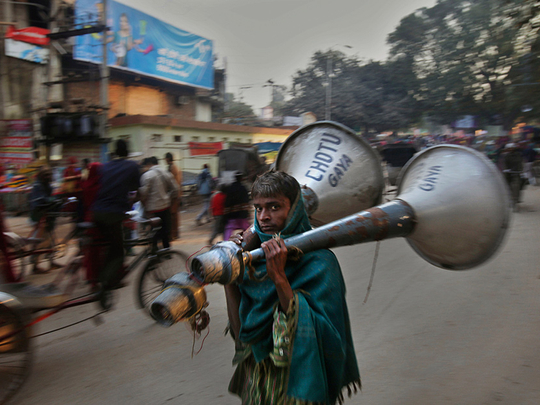
New Delhi: Bollywood playback singer Sonu Nigam’s recent tweet about being woken up by Azaan [Muslim call to prayer] blaring from loudspeakers has led to people losing their sleep over the issue of allowing loudspeakers in religious places.
Nigam resides near a mosque in Mumbai and his tweet read: “God bless everyone. I’m not a Muslim and I have to be woken up by the azaan in the morning. When will this forced religiousness end in India.”
In his further tweets, the singer referred to the public playing of sermons at mosques, temples and gurdwaras as ‘goondagardi’ (hooliganism).
Following this, a national daily conducted a survey wherein 74 respondents said the use of loudspeakers should be banned at all religious places.
When contacted by Gulf News, inspector Satyendra Yadav of Delhi Police said, “In the last couple of days, we have suddenly begun getting more calls from people asking us to stop temples, mosques and gurdwaras from using loudspeakers. However, few wish to come out in the open and lodge an official complaint for fear of being called anti-religious or being ridiculed by friends and neighbours. Most people stoically suffer the loud sounds.”
According to Delhi Police, it gets 30 to 40 calls daily regarding loudspeaker-related violations.
This number goes up tremendously during the festive seasons when religious programmes are held.
Yadav said, “Even though we have limitations, as there is lack of equipment to measure noise level, we do act on complaints. Often, on reaching the venue, we are unable to hear the person standing next to us, so that in itself is a yardstick to go by for creating noise pollution.”
While what prompted the singer’s concern was the early morning azaan in his Mumbai locality, Shahi Imam of Fatehpuri Masjid Dr Mufti M Mukarram Ahmad said, “What I understand from Nigam’s tweet is that he is against noise pollution. We absolutely agree to that and expect religious institutions to abide by the rules. Noise of any kind should not be permitted, whether it is from religious sites or even traffic on the road.”
Ahmad, who has been the Fatehpuri Masjid Iman for the last 47 years added, “We live in a secular society and must find ways to control noise pollution in the environment as a whole.”
In 2015, while the Supreme Court had advised against the use of loudspeakers as they cause noise pollution and that these should be used in moderation, it refused to entertain a PIL (Public Interest Litigation) filed by social activist Vineet Narain seeking a ban on use of loudspeakers at religious sites. “There are directions in place that this court has already given,” the court had maintained.
The apex court had in 2005 permitted the use of loudspeakers till 10pm, while setting the limit for noise levels in residential areas at 55 decibels.
But irrespective of that, loudspeakers continue to be used at a much higher decibels not only early in the morning, but also late in the night, especially during marriage functions.
Seeking a ban on the use of loudspeakers at all places of worship, irrespective of religions, Narain’s PIL had stated, “Not only it creates noise pollution, but it also threatens the very safety of peace-loving citizens of this country. It has been observed that loudspeakers at such places have become the cause of communal tension, eventually leading to communal riots.”
Narain stressed that several Supreme Court judgements directing the reduction of noise level have been ignored and no government has bothered to abide by the rules. “The riots and murders of innocent people have brought disrepute to our nation for a long time. Originally, all religious places were the source to attain peace and tranquillity and the purpose of sermons was to enlighten the human soul.”
“Over the decades, it has taken an absolutely different connotation,” admitted Surya Prakash, a priest serving in an east Delhi temple. “Whatever it be, religious establishments must pay heed to the Supreme Court advisory on ensuring loudspeakers do not cause noise pollution,” he added.
Meanwhile, in the brouhaha over singer Nigam’s azaan tweet, Syed Sha Atef Ali Al Quaderi, vice president of West Bengal Minority United Council issued a fatwa offering Rs1 million (Dh56,851) to anyone who would shave Nigam’s head.
But on Wednesday, the singer himself got his head tonsured at his residence and demanded the amount promised by Quaderi be paid to him. To which the cleric replied, “What I said was that the reward would go to someone who would shave Nigam’s head, put a garland of torn shoes around his neck and tour him around the country.”












